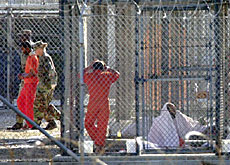UN human rights body faces “do or die” moment

Swiss and international non-governmental organisations say the United Nations' top human rights body must take action to restore its waning credibility.
Their calls came ahead of the opening of the 61st annual session of the UN Commission on Human Rights (UNCHR) in Geneva on Monday.
Both Human Rights Watch and the Swiss branch of Amnesty International say the effectiveness and integrity of the Commission have been severely undermined in recent years by the political and economic interests of its member states.
They also accuse the Commission of resorting to double standards in addressing country violations and say its reluctance to point the finger at certain governments has led to a “shameful failure” to protect human rights.
“What this Commission does, for example, about the situation in Sudan will say a lot about whether it’s ready for reform,” said Amnesty’s representative to the UN in Geneva, Peter Splinter.
“Are we going to have another milk toast resolution or is the Commission prepared to take a stand?” he added.
Refuge
Splinter’s comments were echoed by the executive director of Human Rights Watch, Kenneth Roth, who warned this year’s session was a “do or die” moment for the Commission.
“The Commission has become a refuge for governments like Sudan, which should be in the dock rather than on the top UN rights body,” said Roth.
“It must focus on protecting human rights, instead of blocking criticism of members that commit serious rights abuses,” he added.
In December 2004, the UNCHR came in for heavy criticism by a high-level UN review panel, which cited its “eroding credibility and professionalism”.
Now, both Amnesty and Human Rights Watch are urging the Commission to take advantage of the UN’s current, broader reform process in order to institute much-needed change.
“The high-level panel report threw down the gauntlet and cast into doubt the overall reputation of the UN,” Splinter said.
“So this is an important opportunity to improve the way the UN deals with human rights in general.”
Close scrutiny
Over the next six weeks, NGOs are hoping to see the UNCHR take action to ensure proper monitoring of human rights abuses in Iran, Sudan, Chechnya, the Palestinian occupied territories, Zimbabwe and the Great Lakes region of Africa.
Human Rights Watch has also called on the Commission to condemn the “disappearances, torture and other mistreatment of detainees by the United States in its global war on terror”.
Meanwhile, Amnesty has slammed the Bush administration for sanctioning detention conditions and interrogation techniques that “violate international standards” at its naval base in Guantanamo Bay, Cuba.
Both groups are also keen to see the Commission expand the mandate of Robert Goldman, who was appointed last year by the UN to monitor governments’ respect for human rights as they fight terrorism.
Nepalese catastrophe
Besides counter-terrorism, the other main issue at the top of the NGOs’ watch list is Nepal.
According to Splinter, the country is on the brink of a human rights catastrophe.
“Abuses there include disappearances, torture and summary executions,” he said. “And if the international community doesn’t act, things are going to get a lot worse.”
Dozens of political activists – including the heads of mainstream political parties – have been in detention or under house arrest since King Gyanendra grabbed power at the start of February.
The Swiss government has so far refused to go on record with its plans for this year’s gathering, saying that the foreign minister, Micheline Calmy-Rey, will outline her goals and expectations for the 61st session during a speech on Monday afternoon.
But government sources in Geneva say Switzerland plans to push for a resolution on Nepal.
“We’re very encouraged that Switzerland is bringing forward an initiative on Nepal,” Splinter told swissinfo.
“Of course, as the negotiations take root, I’m sure we’ll have differences of views… but we welcome the Swiss proposal.”
swissinfo, Anna Nelson in Geneva
The United Nations Commission on Human Rights meets annually in March and April for a six-week session in Geneva.
It is the UN’s top human rights body and is made up of 53 member states, which are elected by the UN’s Economic and Social Council (Ecosoc).
The members serve for a three-year period and can be re-elected.
Switzerland is not a member of the Commission but hopes to become one by 2007.
Non-governmental organisations have called on the UN Commission on Human Rights to take drastic action to restore its sinking credibility.
Amnesty International and Human Rights Watch say political wrangling among member states is preventing the Geneva-based body from protecting and promoting human rights.
The groups are also hoping to see the Commission take a stand on human rights abuses in Nepal, Sudan, Iran, Colombia, and Guantanamo Bay as well as the issue of counter-terrorism at its annual session in Geneva, which starts Monday.

In compliance with the JTI standards
More: SWI swissinfo.ch certified by the Journalism Trust Initiative












You can find an overview of ongoing debates with our journalists here . Please join us!
If you want to start a conversation about a topic raised in this article or want to report factual errors, email us at english@swissinfo.ch.